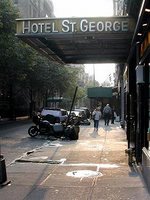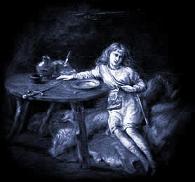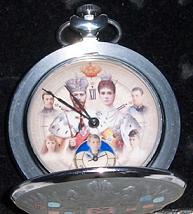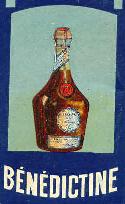
Continuing from page 8, Miller writes about a quotation transcribed onto a piece of butcher paper by Stasia [8.24] (Jean Kronski).
9.1 “That strange thinker, N Federov, a Russian of the Russians, will found his own original form of anarchism, one hostile to the State.”Nikolai Federov (1829-1903) was a Russian philosopher who advocated a pro-love, anti-death position; an
immortalist, he sought to advance science in the name of preventing or resurrecting from death. I couldn't locate this
exact quote anywhere, but the words seems paraphrased from
this 1915 tribute by N.A. Berdyaev, which includes this quote:
"What is it with this strange thinker, with this extraordinary man, so held in high regard by the greatest of Russian people? (In Russia at present after the Revolution the ideas of Fedorov have become popular and there has formed a Fedorov current of thought. He answers to the instincts for action, community and a radical restructuring of the world.)"Miller uses the fact that Stasia wrote this down as evidence that she "is in her right mind," probably because Miller himself sympathizes with the sentiment of individual freedom in opposition to forces of social oppression ("the State").
9.2 KronskiThis would be Dr. Kronski, whom we'll soon see is treating Stasia in the "Obervation Ward" [8.26]. In reality, Kronski--given Jean's last name in Miller's fiction--was his friend Emil Conason. He also appears in
Sexus and
Plexus.
9.3 bughouseEuphemism for a mental hospital.
9.4 Yesterday, was it?Miller is trying to recall the day on which the follwoing event occured, "about four in the morning." Due to the snow mentioned on this page and the fact that the Chrsitmas scene comes later, I would place this day within the month of November 1926.
 9.5 while walking to the subway station
9.5 while walking to the subway stationIt seems to closest subway station to Henry's home on
Remsen Street in Brooklyn would have been the
Clark Street Station, which opened in 1919 (I'm no expert, so figure it out yourself on this
NYC subway map). Clark is four blocks north of Remsen. Court Street Station would now be closer, but it didn't open until 1936. Henry was out looking for Mona (June).
[see 9.14] [the entrance for this station is beneath the awning for Hotel St. George, seen at left from
http://www.mpinto.org/wonderland/index16.html]
9.6 MonaThough she's been alluded to, this is the first time Henry mentions her by name in
Nexus. This is
June Mansfield Miller, his second wife.
9.7 wrestler friend Jim DriscollHenry thinks he sees Mona walking through the snow with this other man. My research has not uncovered any significant New York wrestlers named Jim or James Driscoll. Probably just a local amateur jock. Henry's concern is they look too happy and joyous together, "Free as meadow larks." [see
my post regarding the possibility that this is actually Nat Pendleton, pro wrestler and actor].
 9.8 “Hark, hark, the lark at heaven’s gate sings!”
9.8 “Hark, hark, the lark at heaven’s gate sings!”This quote follows the last bit about meadow larks. It's from Shakespeare's
Cymbeline [image at left]. It's part of a song lyric within the play, used by a character to woo his love interest (according to the
analysis on Phrases.org).
9.9 Osiecki's flatWhile tailing Mona and the wrestler, Henry finds himself in the direction of Osiecki's flat. Osiecki (never mentioned by first name) was a character portrayed in
Plexus: a Canadian architect whom Henry met while leaving a bar one night. He and Joe O'Reagan befriended Osiecki, despite his obsessive paranoia and lame girlfriends.
If anyone has easy access to New York City Directories for 1926, let me know if you find an Osiecki in this neighbourhood. When Osiecki was last been mentioned in
Plexus, he was back in Canada, but obviously he had returned to Brooklyn by this time.
9.10 pianolaA
pianola is a player piano. Osiecki's interest in playing the pianola appears in
Plexus on page 116. The next few references appear to be an attempt to summarize Osiecki (who returns later in the story) as he appeared in
Plexus.
9.11 “morceaux choisi de”French for "selected pieces by." Miller uses French phrases throughout his writings, though I've never studied the reasons for his usage. In this case, he seems to be going for playful pretention.
9.12 DohnanyiThe "pieces" referred to are those by
Ernst von Dohnanyi (1877-1960), a Hungarian pianist and composer. On page 628 of
Plexus, Miller had mentioned that Osiecki had "conceived a passion" for Dohnanyi.
9.13 "Hail to you, sweet lice"Again, this is a reference to Osiecki in
Plexus, in which he showed a paranoia about lice (probably imaginary) being planted on him by others (
Plexus, pgs 101, 114, 115, 166).
9.14 Gowanus Canal 
A mist rises above it. Miller then returns home. The Gowanus Canal [right] stems out of Upper New York Harbor and weaves up into Brooklyn, ending just north of Union Street, which is several blocks south-east of Remsen Street. If he was going in this direction, the subway station he referred to earlier may have been
Borough Hall or
Bergen Street.
9.15 arriving homeThe "home" being referred to is
91 Remsen Street, Brooklyn [I'm wrong here--see below]. Miller lived in the basement with Mona and Stasia. Miller then proceeds to grill Mona about seeing her with Jim Driscoll. She denies this and insinutes that he's ill.
**UPDATE JULY 29/06 - After compiling my
list of Miller's New York addresses, I realize that he was no longer at #91 Remsen at the time. He had been there in 1925, then moved back to an unknown apartment here in 1927. There's also a chance that he was on Henry Street by this time, though I can't be sure. He and June and Jean moved to Henry St not long after she started staying with them on Remsen Street.
9.16 the rent overdueMiller was not working (or, was not in
gainful employment) at the time (in order to write) and Mona's funds came in waves from admirers. Later, on page 51, it is suggested that Mona and Stasia raised rent money through prostitution or sexual exhibition.
9.17 Six o'clockHenry has just been out for two hours, looking for Mona.
<---
previous page 8 next page 10 --->











